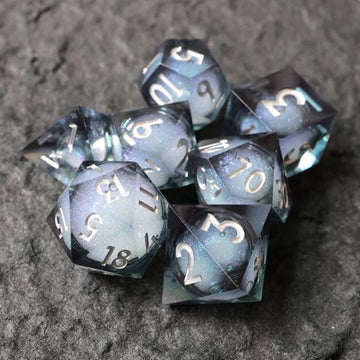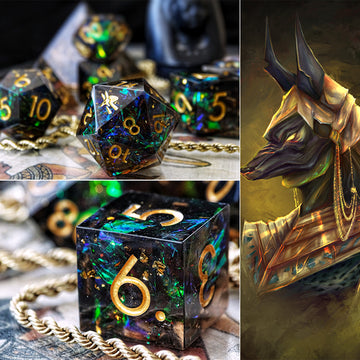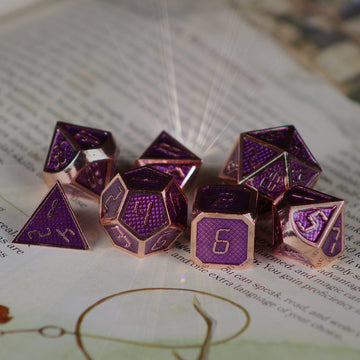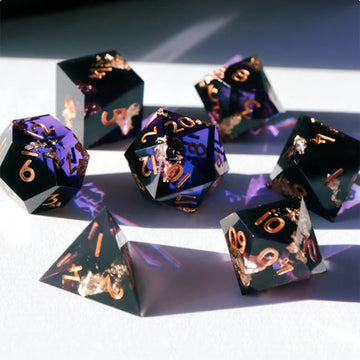Title image © Anato Finnstark
DnD Rules Lawyers: The Good, the Bad, and the Ugly Versions
Rules Lawyers... ya either hate 'em or you love 'em.
Personally, I LOVE THEM and always want one at my table. But not every rules lawyer is created equal... some downright SUCK; there are different kinds of rules lawyers out there.
Because I like the title of this blog post, I am going to group and rules lawyers into three categories: good, bad, and ugly. I'm going to talk about each, and the impact they have at the table, and discuss how game masters and players can best mitigate their annoying, game-damaging tendencies.
I will finish with "the good" rules lawyer player and explain just how helpful they can be for the DM and any DnD campaign.
What is a Rules Lawyer?
A rules lawyer is a player in the gaming group who goes out of their way to enforce the rules of the game and impose them on every situation. To a rules lawyer, every rule is an important rule, and they take every opportunity to enforce them.
There are many different types of rules lawyers, but they tend to have a few things in common.
- They have extensive knowledge on the rules
- They usually have years of experience playing and have seen the rules used
- They tend to care about fairness
- They have actually read each rule book (something EVERY player should do... yes, I am looking at YOU dear reader)
- They understand not only the rules, but the arguments for and against different interpretations of those rules
- They are consistent: they want players and DMs to both follow the rules ("don't even fudge the dice!")
Finally... and this should go without saying... but a rules lawyer is not an actual lawyer. While Wizards of the Coast has a legal team, no one on that team has "rules lawyer" in their title. On top of that, at least in the United States, the actual law does not recognize any rules lawyer. (I know... this paragraph is STUPID, but we live in an SEO world and SEO likes certain keywords...)
"What is the difference between a rules lawyer and a powergamer in D&D?"
A power gamer (or a meta gamer) is someone who uses every single rule to optimize their own character and play style. They care about gaining each and every advantage possible so that they can be as powerful as possible. If the DM lets them bend the rules to become even stronger and more effective, so be it!
A true rules lawyer is about following the rules. Whatever rules the group as agreed upon... or whatever precedent has been set, should be followed.
Expensive Yet Affordable DnD Sets
Yeah... That Sounds Pretty Good
Shop DnD Dice Now

© Anato Finnstark for MTG
"The Ugly" Rules Lawyer = Mr. No Fun/Control Freak
This is the "rules lawyer archetype" I believe comes first to most people's minds.
This kind of rules lawyer is a "letter of the law" kind of guy. They likely know not only the PHB intimately, but they know multiple PHBs from multiple editions. They can recite game rules from card games, board games, war games, etc. They take the rigidity from these other games and apply them to TTRPGs, offering little leeway.
The big problem with this type of rules lawyer is that they forget that they are NOT the authority figure in the game. The rulebook may say one thing, but the final word belongs to the game master. And I don't know what is happening in their brains, but on some subconscious level I am sure it goes something like this:
- Rules are good
- They are breaking the rules
- To break the rules is bad
- Therefore, they are bad
- Therefore, I must stop them
Logically valid? Yes.
Logically sound? NOOOOOOOO.
Rules are good, but breaking the rules does not mean that you are playing DnD bad. Gary Gygax famously declared, "The secret we should never let game masters know is that they don't need any rules." The rules are technically optional, the DM is the one who holds the ultimate authority, not the DMG.
Thankfully, I have not been forced to play with this kind of player. I have, however, been forced to play with this kind of DM. I talked about it in this blog post, but a quick summary:
- I had this super-cool idea for a lute-playing owlbear character
- "The Owlbear Owl Bard"
- But they were cowardly and literally incapable of martial combat
- I would just use the Bugbear racial stat block
- But because it was "against the rules," my DM would not allow it.
It was dumb. And it sucked. And it is no surprise that campaign was never completed by anyone at the table.
What to Do About "The Ugly"?
I would suggest a few things:
1) If at all possible, have the conversation with/as the DM and in private away from the game table. The more you protect their dignity, the more likely they will be willing to listen. Otherwise, you will be bashing against a self-defensive ego, and that rarely results in anything positive.
2) Before you shout them down and tell them how wrong they are and what a problem they are for the table... ask them what kind of campaign they would like to play and what they think they are doing when they rules-lawyer so aggressively. This isn't twitter... you have more than a moment and 280 characters. You can slow down and understand where they are coming from before speaking. There is even a small chance you might discover that they are right about something.
3) If at all possible, try to find common ground. Compromise is not a bad word. DnD has no winners, but it can have losers. And kicking a player out and/or a player feeling they have to leave is definitely a "loss." Collaborative storytelling is going to have its conflict. In fact, I would argue that there is no collaboration without SOME conflict.
4) Finally, once you have really heard them, they feel understood, and you have encouraged their good intentions... establish some boundaries. Tell them how you plan to DM the game going forward. Offer them "The Good" rules lawyer role (read on for more info), but remind them that, at the end of the day, the DM decides how the game is played.
Remember, the goal is not to "eradicate" their rules lawyer tendencies. That is impossible (and in this case, psychologically and emotionally unhealthy). The goal is to funnel their lawyering energies in the right direction. Which brings us to the next type of rules lawyer.

© Anato Finnstark
"The Bad" 5e Rules Lawyer = Unnecessary Interventions
The "ugly" rules lawyers actively make the game worse. So much so that an intervention outside of the session is necessary. But there is another set of "rules lawyers" that are not so overzealous that they ruin the very spirit of the game.
"The Bad" rules lawyers do not ruin a campaign... but they certainly make campaigns worse. In fact, I have a great example of a rules lawyer making a session much, much worse due to their rule lawyering.
It's me. I WAS "THE BAD" RULES LAWYER.
And now it's story time (previously posted in THIS blog post).
During one session, it became clear that if our party was going to find The Tomb of Obereck, we would have to retrieve a clue from the bottom of a VERY deep lake.
The obvious problem was that our party consisted of a human (can't breathe water), a firbolg (can't breath water, strongly prefers land), and an aarakocra (can't breath water and HATES being anywhere that does not have an open sky... to the point of refusing to go).
Even when we "coincidentally" stumbled upon some potions of water breathing, we were pretty skeptical. Because no matter what, we would each be sitting ducks to any aquatic creature or monster attacking us. And since this was Dungeons and Dragons, that was definitely going to happen.
But... "adventure is out there!" ...so off we went. We arrived at the lake, dove in, and swam deep, deep into the dark waters... guided by a magic scepter that glowed brighter as we got closer. And, at the bottom of the lake, amidst the ruins of some ancient civilization, we found a porcelain vase detailing the burying of some long forgotten king.
But wouldn't you know it? Juuuuuuuuuuuuust after we got the vase, suddenly some giant, monstrous, deep lake frogs (2) began attacking us! Seems like that happens so often in DnD... huh?

Needless to say, as soon as the GM showed us a picture of the monstrosity and the huge tokens popped up on the virtual map, we players were terrified.
Thankfully, I had a trick up my sleeve... an emergency spell I could use as a Hail Mary in case things went south. For I was a cleric... and I had prepared Banishment.
Now if the creature had high charisma, like some sort of water fey or black dragon, we were still screwed. But if the monster more resembled a beast than a magical foe, the better chance we had. And based on the monsters' attacks and how the DM was role-playing them, I thought we had a shot.
So when it came to my turn, I took a moment to survey the battlefield... to really consider if NOW was the moment I should play this card. And given the action economy, it seemed prudent to give us the advantage earlier rather than later.
Me: "Okay... you each see beaming light emit from my holy symbol... and another beaming light surrounding one of the monsters... as I pray to Pelor, and the cold water fills my throat, I beseech his good will to grant me strength and banish these beats into oblivion!"
Me: "The monster has to make a Charisma Saving throw."
DM: (Rolls)
DM: ... "27?"
My face dropped.
That was it... that was my backup plan... my ace in the hole... and not only did it fail spectacularly, but it revealed that it would fail even if I tried to cast it again. Defeated, I swam further away, and it moved to the next turn.
But as my friends began taking their turns, something seemed off. I couldn't shake the feeling that something was so weird about that. I mean, a 27?!? That seems REALLY high.
So... I did something I had never done before and have never done since: I looked up the monster stats.
I KNOW, I KNOW, I KNOW... DOESN'T THAT MAKE ME THE MONSTER?!? WHAT KIND OF PLAYER DOES THAT?!?!
But in my moment of weakness, I had a sneaking suspicion, and so I did a quick google search... and discovered the problem.

The Gitrog has a charisma of 5... a -3 modifier... literally impossible for it to roll any higher than a 17... and my DM said it was a 27...
Me: "Um... Ned... you said you got a 27, right?"
DM: "Yeah, that's right."
Me: "Well... the stat block has a charisma of 5..."
DM: "YOU LOOKED UP THE STATS?!?!?"
Other players: "OMG..."
The DM got defensive and angry... I got defensive and angry... I was accused of cheating... he accused me of metagaming... trust had been broken... and it was ugly.
Now as bad as it was, it wasn't fatal; we all had to take a moment before continuing the combat, and were able to continue the campaign. Miraculously, we did survive this encounter (that is a story for another time) and in such a way that it completely redeemed this experience, but I want to use this post to really hammer home the point.
What to Do About "The Bad"?
Bad rules lawyers usually do not need a sit-down; a strong scolding mid-session is enough to put them/us in our place. But if the problem persists, a simple announcement of the following before a session might be enough to curtain their worst tendencies:
Agree on a Set of Rules: If you did not do a session zero, now is the time to make up for that mistake. Establish the mechanical foundations for the game. Any rules that have created conflict, have a discussion and decide as a group what is best for your campaign.
Play in Good Faith: I believe this was included in the One DnD/5.5 PHB... so I'm glad they got at least SOMETHING right... but inform your players that tabletop RPGs are, in fact, cooperative storytelling. And in order for a TTRPG to work, the players need to play in good faith. They cannot demand justice sometimes and leniency other times whenever it benefits them.
Letter vs Spirit of the Law: You could argue that the whole "rules lawyer dnd debate" is just an argument about this concept. Do you follow exactly what the rule says? Or do you attempt to pursue what the rule was trying to create? The "letter of the law" people will defend its stability and credibility... all the while exploiting every loophole imaginable, which is why imo they are "bad rules lawyers."
My undergrad was at a Christian University where students had to sign a "code of conduct contract" and BOY HOWDY did we debate the "spirit vs letter" of the law. Thankfully, DnD has fewer moral and impassioned arguments behind its rule following. Decide what kind of DM you are going to be, whether you will be more literal or more interpretive, and communicate that to your players. That way, next time the bad rules lawyer (like me...) says: "But that's not in the monster stat block?!" You can simply respond with "Yes, I changed it" and simply not tell your players WHEN you changed it!
Thankfully, it is also not very hard to turn a good-intentioned bad rules lawyer into a good one...
Even Bad Players Could Use Some Good Dice
Shop DnD Dice Now
"The Good" DnD Rules Lawyer = Mr. Helpful
These are the rules lawyers you want at your table! And rather than argue until I am blue in the face, here is an Instagram reel from the "Heroic Round Podcast."
I have felt this way for YEARS, and I was excited to see someone communicate the truth so succinctly.
What truth? This truth:
THE DM HAS TOO DAMN MUCH ON THEIR PLATE.
And because we have so damn much on our plate...
It is really, really, really, really nice to have someone focused a little more on keeping consistency with the rules.
The DM is the deity of the game... the all powerful arbiter of gameplay. But "Dungeon Master" is a title, and while the DM holds an omnipotent scepter, the person in that position is a fallible human being.
And sometimes that fallible human being gets caught up in the moment, or excited, or tempted, or forgetful. It makes sense why: they have a million and a half things they have to keep track of in every session, let alone every campaign. And with the responsibility of leading everyone to have a great time, it can be easy to justify cutting corners.
And sometimes cutting those corners harms player characters. Sometimes DMs give unnecessary disadvantage. Sometimes they go too far in limiting player agency because it is convenient. And do you know what those players could use in that moment.
An advocate... a defender... a LAWYER.
The rules lawyer is the advocate for the players.
To go back to my Christian undergrad days and tie that reference into a neat bow, a famous word for the Holy Spirit is "Paraclete" (παράκλητος, paraklētos), which translates to "advocate" or "helper."
And at the risk of inflating the narcissism of rules lawyers everywhere, you are free to see yourselves a pure, holy, righteous advocate for the players. You are given some authority in your own right: "voice of the PHB/DMG." And their job is to rush to their defense in the face of an accuser in a cruel word!
What to Do About "The Good"?
They are there to help you, so let them! Their rules lawyering is not a bad thing. But with my rules lawyers (I'll call them "Coffee Beard" and "Mr. Pickles"), I have established a process for keeping order. One thing you want to be aware of is that the rules lawyering does not badly interrupt the immersion and flow of the game. So we go through this process:
- I, the DM, do have final say, but it is my job to listen to their defense.
- They make their case.
- If I have a disagreement, I respond with my counterpoint.
- They have one more opportunity to push back.
- If I am not convinced, then the discussion ends. You do not want an endless back and forth between judge and the defense.
Regardless, at some point you'll need to make a decree and stand your ground.

© Anato Finnstark
Recently, this happened in a session. Players came across a vampire tomb covered in foreboding hieroglyphs. Naturally, they assured that "Comprehend Languages" would suffice to interpret everything on the walls. However, this did not work for me because:
A) It would completely ruin the suspense of the encounter.
B) This tomb was built WAAAAY before that spell was codified (which I believe matters).
C) The script is so dead that no wizard would have included it in the spell.
D) Teeeeeechnically hieroglyphs are NOT a language, but a script, and therefore the wording of the spell does not apply.
The affected players, especially the opinionated ones, HOWLED in protest. They gave their arguments. The rules lawyer came to their defense.
And yet, I did not rule in their favor.
And that is ok :) You are not a jerk for disagreeing.
Each given situation is different, and you only have a little time to be the "umpire" and make a choice.
Conclusion
Your rules lawyer CANNOT be a metagamer.
The Rules Lawyer Has Made Their Case...
You Deserve Some New Dice!
Shop DnD Dice Now
Riley Rath

Riley is a freelance tabletop games copywriter, content writer, and marketer based out of Spokane, WA. When not playing or writing about board games or DnD, he is busy with family, hiking, cooking, and gardening... very hobbit-like for a 6'4'' dude.
Follow this link to see what DnD + board game marketing tasks I can do for you.










